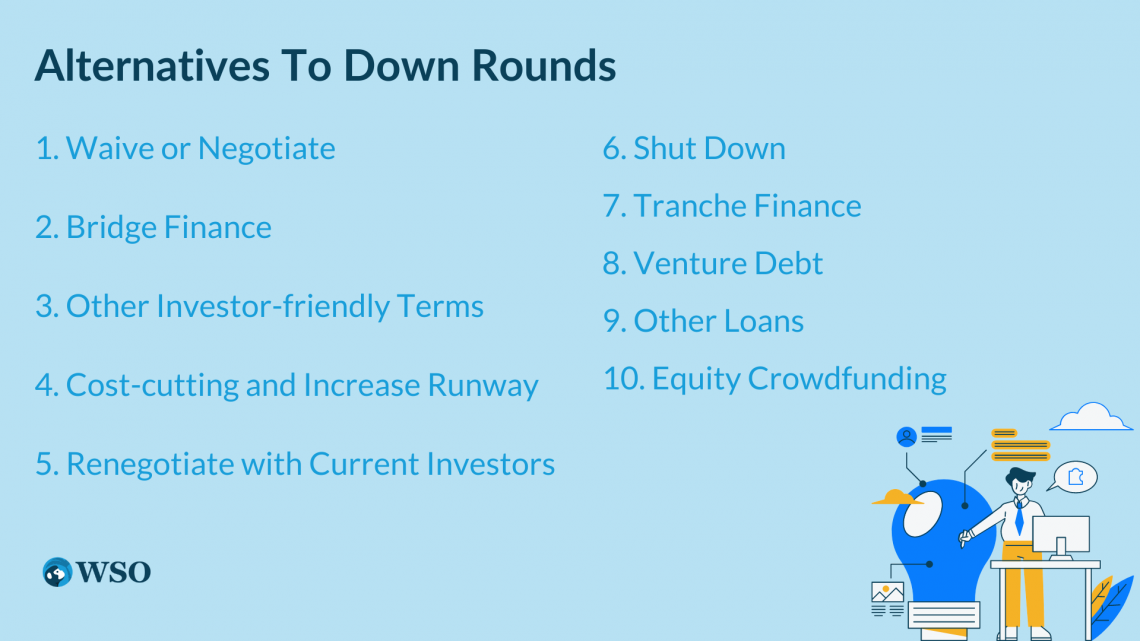Down Round
Occur when a company sells its shares at a lower price than in previous financing rounds
A down round is a term used in finance and investment. It refers to a funding round in which a company raises capital at a valuation lower than its previous funding round.

These are financing transactions, where a company sells its shares at a reduced price compared to what it sold for in an earlier round of funding.
These rounds are often perceived more negatively than flat or up rounds. Even a slight decrease in share price can carry significant negative baggage, impacting a company's reputation and investor confidence.
Flat rounds are rounds where the company's valuation remains the same as the previous rounds.
Up rounds are rounds where the company's valuation is higher than the previous rounds.
Such rounds may require existing investors to "write down" the value of their holdings because the fair value of shares decreases after a down round, impacting the fund's financial statements and potentially hindering future fundraising efforts.

It may be caused by various factors such as a company facing:
- Financial targets
- Industry decline
- Increase competition
- Unfavorable market conditions or a black swan event.
These down rounds can also occur if a company experiences significant setbacks, such as product failures, regulatory issues, or management problems.
Rounds may prove challenging for existing shareholders but can attract new investors attracted to low valuations as an opportunity to acquire shares of a potentially undervalued company.
These rounds can often identify financial difficulties or a lack of confidence in a company, which may or may not give off a negative outlook to its potential investors.

For example, imagine someone with a collection of cards who desires to exchange them for cash. Each card represents a share in a particular company. The greater the number of cards a person possesses, the greater their ownership stake in that company.
Let's say that someone traded some of their cards for cash. But all of a sudden, the cards are no longer as popular, and now no one wants to trade cash for the cards any longer.
In business also, the similar can happen. When a company needs money, it may sell shares (like cards) to investors in exchange for cash. Sometimes the value of a company falls, and it must sell more shares to raise additional funds. This is called a "down round."
The company sells its shares at a lower price in these rounds than in previous rounds.
This means that the people who have already invested in the company and own shares might be unhappy because the value of their shares has decreased.
New investors willing to take the risks involved in an unsuccessful company will benefit from such a reduction in share price.
Key Takeaways
- Down rounds occur when a company sells its shares at a lower price than in previous financing rounds.
- Various factors, such as failure to deliver on expectations, increased competition, a decline in the economy, an internal problem, or shifts in investor sentiment, may cause a drop in price per share.
- Down rounds can have significant implications, such as triggering anti-dilution protection for investors, sending negative signals to the market, reducing motivation and control for founders, and impacting employee morale. However, they can also attract new investors who see an opportunity in the undervalued shares in a company.
- Alternatives to this round include negotiating with investors, exploring bridge financing or venture debt, renegotiating terms with current investors, cutting costs, increasing runway, or even considering shutting down the company in extreme cases.
Reasons for Down Round
These occur due to various reasons, not limited to:

1. Failure Meeting Investor Expectations
If a company fails to achieve the milestones or targets set during previous funding rounds, it can lead to a downward financing round.
It could be that the shareholders have foreseen a certain increase in growth and profitability, which may result in reduced valuation for the company if such targets are not met.
2. Increased Competition
The entry of new competitors or a more competitive market environment can impact a company's valuation. Because it is less able to gain market share due to increased competition, it may fall in price.
NOTE
Potential investors may value such an undervalued stock should they see its value and potential in the market.
3. Market Declines
During general economic downturns or stock market declines, investor appetite for risk may decrease. This can result in lower valuations for private companies across the board, regardless of individual company performance.
Companies seeking funding during such periods may face this round of funding due to unfavorable market conditions.
4. Internal Problems or Setbacks
Internal issues like legal disputes, revenue misses, operational challenges, or competitive pressures can also trigger such rounds.
If these problems impact the company's performance and undermine investor confidence, it can lead to a lower valuation in subsequent funding rounds.
5. Market Trends and investor sentiment
Specific sectors or industries may fall out of favor with investors for various reasons.
For example, declining interest or skepticism towards a specific technology or market segment can result in down rounds for companies operating in that space. Changes in investor sentiment and preferences can significantly influence valuations.
NOTE
It is important to note that this round does not necessarily indicate a fundamental problem with the company. It can occur due to external factors or market conditions beyond a company's control.
Down rounds can be a way for companies to secure additional funding to overcome challenges or navigate difficult market conditions. It can, however, also be accompanied by dilution of shareholders' shares, loss of investor confidence, and a reduction in employee morale.
Implications of Down Rounds
Now let us examine the implications of a down round, including anti-dilution protection triggering, loss of trust among investors and stakeholders, reduced control, and negative impact on employee morale.

The implications are as follows:
1. Triggering Anti-dilution Protection
A down round typically triggers anti-dilution protection for investors. Anti-dilution protection means that when shares are sold at a lower price than the investor originally paid, they will be less diluted than when other parties invest.
2. Negative Signaling and Loss of Trust
This type of round sends negative signals to the market and investors. This may signify that the company is facing difficulties, potentially resulting in a decrease in trust regarding its ability to fulfill obligations.
Consequently, the company's reputation and stakeholder relationships could be negatively impacted.
3. Reduced Motivation and Control
Down rounds can lead to decreased motivation and control on behalf of the founders and management.
NOTE
When the company's value decreases, founders and management may have less influence over decision-making and the company's direction, which can impact their commitment and drive.
4. Low Company Morale
Down rounds can hurt employee morale. Employees' value of share capital may be significantly reduced when a company's valuation is lowered.
Employees who have already exercised their stock options at a higher price might be impacted, while those not exercising them may find the value of their shares to be very low. This can create uncertainty and demotivate employees.
Companies can take steps to mitigate the implications of these rounds, such as renegotiating terms with investors, providing support to employees affected by dilution, and taking action to rebuild trust and confidence in the company's prospects.
Alternatives to Down Rounds
Here are several alternatives that can be considered:

1. Waive or Negotiate
Founders can negotiate with investors to waive or reduce anti-dilution adjustments. This can help maintain the ownership stakes of common stockholders and incentivize management to continue operating the business.
Renegotiating terms from previous financing rounds can provide an opportunity to find a mutually beneficial solution.
2. Bridge Finance
In situations where a company needs short-term cash to overcome a temporary setback or reach the next inflection point, bridge financing can be a viable option.
Convertible notes can be used, which are financial instruments commonly used in startup funding.
NOTE
Convertible Notes are debt instruments that can convert into equity or stock in the future, typically upon the occurrence of certain predetermined events, such as a future financing round or the company's initial public offering (IPO).
With the notes converting into the next financing round at a discounted price, this approach can provide immediate funding while addressing the valuation issue.
3. Other Investor-friendly Terms
Investors can be offered more favorable economic terms apart from the price per share.
These terms can include a higher liquidation preference, dividend accrual, participating preferred shares, or warrant coverage.
NOTE
Entrepreneurs must carefully consider the consequences of such rights, as they may negatively impact the common stockholders.
4. Cost-cutting and Increase Runway
By reducing expenses and improving operational efficiency, companies can extend their runway and postpone the need for external fundraising. This option may not be feasible for all organizations, particularly those with significant expenses or limited revenues.
5. Renegotiate with Current Investors
Entrepreneurs can explore the possibility of renegotiating the terms with existing investors. This can involve modifying anti-dilution protections or exchanging these rights for other investor perks, potentially providing upside protection.
6. Shut Down
In extreme cases where the problems are insurmountable, where employees are discontented, and investors are no longer supportive, shutting down the company might be the best course of action.
NOTE
Taking the toughest decision to start a new without any existing baggage or complications can be gruesome, but it has the potential to yield significant benefits in the future.
In addition to these alternatives, there are other options entrepreneurs can consider:
7. Tranche Finance
Instead of receiving the entire investment in one go, founders can negotiate for funds to be released in parts as the company achieves specific milestones. This can provide more flexibility and allow for adjustments based on the company's progress.
8. Venture Debt
Entrepreneurs can explore the possibility of obtaining debt financing from banks or specialized lenders. Venture debt does not dilute shareholders and can be used to bridge the gap between funding rounds.
9. Other Loans
Small enterprises may be able to obtain loans with extended repayment periods depending on the company's situation. This can provide additional capital without dilution.
Platforms dedicated to business fundraising through crowdfunding can be utilized to reach a larger pool of potential investors, including both accredited and unaccredited individuals.
NOTE
Equity crowdfunding allows for selling company shares to a broader audience.
In times of downturn, entrepreneurs need to be very careful when evaluating available options, seeking expert advice, and considering future implications for their businesses and stakeholders.
Examples of Down Round
Successful companies can face challenging periods in their journey, and one of the hurdles they may encounter is a down round of funding.

While this round can be perceived as a setback, some successful companies have navigated through this situation and managed to achieve remarkable growth and success.
1. Uber
In 2016-17, Uber faced challenges in various aspects of its business and raised a down round of funding. The company had to lower its valuation and sell shares at a lower price than in previous rounds.
Yet, despite this setback, Uber was able to make use of the innovation platform and move toward new markets while constantly improving its services.
Uber's comeback has made it visible and influential in transport and logistics, which no one else can claim to be.
2. Ola
Ola is a prominent ride-hailing company in India. Ola faced significant challenges in 2017 when it encountered fierce competition from its main rival, Uber, leading to a down round of funding. The company had to lower its valuation and sell shares at a reduced price.
However, Ola managed to weather the storm, implementing strategic measures such as expanding its services and maintaining a strong market presence in India.
Failed companies can also encounter these rounds as they face financial challenges and struggle to sustain their operations.
NOTE
Despite their best efforts, these companies could not recover and achieve long-term success.
3. Jawbone
Jawbone was a consumer electronics company known for its fitness trackers and Bluetooth speakers.
Despite initially achieving success, the company faced stiff competition and struggled to maintain its market position. In 2017, Jawbone faced financial difficulties and had to raise a down round of funding. However, it filed for bankruptcy and liquidated its assets.
Down Round FAQs

A down round typically decreases the company's valuation, which may require adjustments to the balance sheet and financial statements. This could include lowering the value of intangible assets, revising stockholder equity, or recognizing potential impairments.
Existing investors can protect themselves during such a period by negotiating certain protections in their investment agreements, such as anti-dilution provisions or preferential treatment in future financing rounds.
While these rounds may deter some investors, they can also attract new investors who see the lower valuation as an opportunity to invest in an undervalued company. However, such rounds often indicate challenges that the company needs to overcome.
Downward financing rounds are common, especially during challenging economic conditions or when a company fails to meet expectations. They are often seen as a signal of financial difficulties or a lack of confidence in the company.
These may impact the decision-making power of existing investors.
With new investors coming in at a lower valuation, their ownership stake may be diluted, resulting in reduced influence and control over company decisions. This can lead to changes in board composition or voting rights.
These can trigger default provisions in existing debt agreements, depending on the terms and conditions of the agreements.
These provisions may include covenants related to the company's financial health, such as minimum valuation or equity requirements.
It is important to review debt agreements to understand potential implications.




or Want to Sign up with your social account?